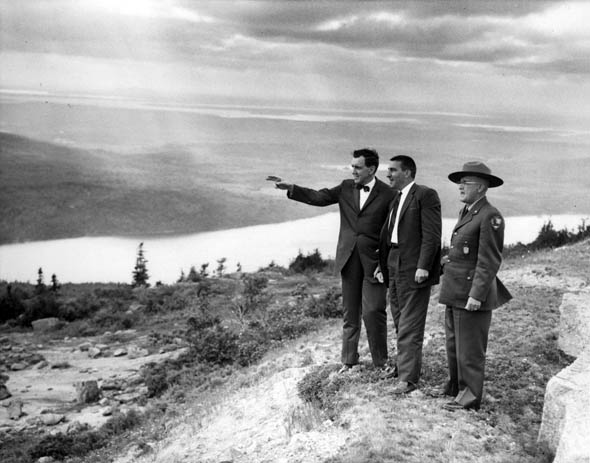Marking its 25th, Muskie Archives offers discussions on Earth Day, diversity
As Bates College begins a yearlong celebration of the 25th anniversary of its Edmund S. Muskie Archives, two panel discussions in May examine topics close to the late U.S. Sen. Muskie and to the college itself.
Muskie, a member of the college’s class of 1936, was a Maine governor, U.S. senator and U.S. secretary of state whose achievements included landmark environmental legislation. The changing meanings of Earth Day are at issue in a panel discussion, co-sponsored by the Office of Sustainability and featuring an original Earth Day organizer, at 4 p.m. Thursday, May 6, in the Muskie Archives, 70 Campus Ave.
A panel the following week explores issues around diversity at Bates. A Diverse History — Race, Class and Gender at Bates College in the 19th Century takes place at 3:30 p.m. Wednesday, May 12, also in the archives.
Both events are free and open to the public. For more information, please contact 207-786-6354 or this muskie@bates.edu.
Dedicated in 1985, the Edmund S. Muskie Archives and Special Collections Library preserves materials documenting the history and experience of the college.
Holdings include a nationally significant body of materials relating to Muskie, including an important oral history and documentary collection that is one of the largest representing a non-presidential U.S. political figure.
The panel discussion Earth Day: Then and Now will look at the evolution of Earth Day from its founding 40 years ago, a time when environmentalism was considered radical, to its current role as a mainstream celebration. Panelists include:
Barbara Reid Alexander, midwestern coordinator for the inaugural Earth Day;
Leon Billings, staff director of the Senate subcommittee that produced the Clean Air and Clean Water acts, and later Muskie’s chief of staff;
Don Hudson, president of the Chewonki Foundation in Wiscasset;
and Bates senior Emily Grady. She will present a paper written by Katrina Lacher, a doctoral candidate at the University of Oklahoma, about the mid-20th-century perception of environmentalism as a radical movement. Lacher, who is unable to attend the panel discussion, used the Muskie Papers extensively last summer to research FBI surveillance of the first Earth Day and Muskie as a result of his involvement with the early environmental movement.
Professor of Economics Lynne Lewis will moderate.
In addition, a short silent film of Muskie speaking on the original Earth Day celebration in Philadelphia will be shown.
In its review of diversity at Bates, the May 12 panel will draw upon early photographs, the papers of Bates’ founding fathers and oral histories about the first African American woman to graduate from the college. The panelists are:
Margaret Creighton, a Bates history professor, who will moderate the discussion;
Bill Hiss, Bates’ executive director for international advancement, who will talk about diversity in the context of the college’s early history;
John Smedley, a physics professor who will profile Stella James, a physics major in the class of 1897 who was the first African American woman to graduate from Bates;
and Tim Larson, of the Bates class of 2005, who for his senior thesis used the early records of Bates to examine the progressive tradition at the college from 1855 to 1877 (the end of Reconstruction) in regard to race, class and gender.



